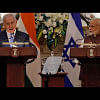Israel’s sense of moral immunity needs breaking

The late Israeli academic, journalist, and politician Uri Avnery once famously described Israel as a small America and America as a huge Israel. If Avnery were alive today, he could be forgiven for including Europe as an extended part of Israel. Uri Avnery was among the founders of the Israeli Council for Israeli-Palestinian Peace. Shortly after the group's founding, Avnery was assaulted and stabbed several times—yet another graphic manifestation of the Zionist state's culture of intolerance to the truth.
Avnery crossed the front lines and met Yasser Arafat on July 3, 1982, during Israel's siege of Beirut. He is said to have been the first Israeli politician to have met personally with Arafat. He was tracked by an Israeli intelligence team that intended to kill Arafat, even if it meant killing Avnery at the same time once the latter had inadvertently led them to Arafat's hide-out. The operation, "Salt Fish," failed when the Palestine Liberation Organization (PLO) managed to lose their trackers in the alleyways of Beirut.
The late Robert Fisk, an English writer, journalist, and a major critic of United States foreign policy in the Middle East, interviewed Avnery shortly following the harrowing Sabra and Shatila massacre of 1982 and asked him how survivors of the Holocaust and their children could look on as 1,700 (the actual figure was said to have crossed 3,000) Palestinians, unarmed men, women, and children, were massacred in cold blood. Avnery replied, "I will tell you something about the Holocaust. It would be nice to believe that people who have undergone suffering have been purified by suffering. But it's the opposite, it makes them worse. It corrupts. There is something in suffering that creates a kind of egoism… You get a moral 'power of attorney,' a permit to do anything you want… This is a moral immunity which is very clearly felt in Israel."
The key question that remains unanswered, though, is how much of the global outrage for Gaza will impact Washington's attitude and its policy of blind and unconditional support for Israel. There are signs of slow but visible unease among the policymakers in the US capital. But with an election looming on the horizon and the gripping power of the Jewish lobby all across the land, how strongly, to quote Avnery, "a large Israel" can confront Israel and unshackle itself from its "most strategic ally" remains to be seen.
Gaza today is Sabra-Shatila multiplied many times.
But then some believe differently. Nothing but respect can there be for someone like Professor Norman Finkelstein, a son of Holocaust survivors. Both his parents were victims of Nazi persecution against the Jews, and still, that has not stopped him from speaking out openly about the truth in the face of denial of the ongoing Israeli genocide in Gaza. Finkelstein has, on more than one occasion, said he is dead against using the Holocaust card to justify Israel's atrocities against the Palestinians and has dared the Jews of the world to do the same if they have any heart.
The present state of Palestinian persecution has its roots in the Nakba of 1948. This historical tragedy finds little or no mention in the narrative that pervades in Western capitals. Israel's continued persecution in Palestine in general, and now the genocide in Gaza in particular, has been possible only because of the direct support from those governments in the West that profess the values of human rights and democracy across the globe but choose to exempt Israel from their list.
The words of Norman Finkelstein and those of the late Uri Avnery did prove that among all the mayhem and Western double standards, there exist voices of sanity; not that those have made much difference to the policymakers in the West. But maybe, just maybe, that could begin to change.
In a case filed by Nicaragua, the World Court will likely rule on Germany's support for Israel. This could be a sign of how geopolitics is shifting as a fallout from the genocide being committed by Israel in Gaza.
Steve Crawshaw, the former Russia and East Europe editor at The Independent and former UK director at Human Rights Watch, in an article in The Guardian on April 9, has said that Germany is under pressure. Crawshaw says that after October 7, Chancellor Olaf Scholz said that "there is only one place for Germany: at Israel's side." It was, Scholz said, "a perpetual task for us to stand up for the security of the state of Israel."
Crawshaw writes, "The good intentions that underlie that philosophy – Israel as Germany's 'raison d'état,' in the words of Scholz's predecessor Angela Merkel – are clear. But Germany's unquestioning support for Israel is becoming increasingly difficult to sustain. Germany sees itself as a global voice for human rights, yet it has continued to sell arms to Israel… German opinion polls have swung dramatically in ways that no politician can ignore. Critics of the Gaza assault have more than doubled to 69%; support for Israel's conduct of the war has collapsed to just 18%. Almost nine in 10 Germans now think there should be more pressure on Israel."
Germany's Green Foreign Minister, Annalena Baerbock, has also said that aid must immediately get into Gaza with "no more excuses." And even Scholz has begun to sound critical, asking on a visit to Israel last month, "No matter how important the goal, can it justify such terribly high costs? Or are there other ways to achieve your goal?" Meanwhile, German lawyers have reportedly brought a case calling for Germany to end its arms sales to Israel. Britain and other governments are facing similar pressures, while a Dutch court found a "clear risk" that exported F-35 jet parts to Israel could be used in breaches of international humanitarian law.
The key question that remains unanswered, though, is how much of the global outrage for Gaza will impact Washington's attitude and its policy of blind and unconditional support for Israel. There are signs of slow but visible unease among the policymakers in the US capital. But with an election looming on the horizon and the gripping power of the Jewish lobby all across the land, how strongly, to quote Avnery, "a large Israel" can confront Israel and unshackle itself from its "most strategic ally" remains to be seen.
In the meantime, Palestinians continue to pay with blood for the horrific crimes committed by Europe on the Jews for ages.
Bir Bikram Shamsher M Chowdhury is former Foreign Secretary of Bangladesh.
Views expressed in this article are the author's own.
Follow The Daily Star Opinion on Facebook for the latest opinions, commentaries and analyses by experts and professionals. To contribute your article or letter to The Daily Star Opinion, see our guidelines for submission.

 For all latest news, follow The Daily Star's Google News channel.
For all latest news, follow The Daily Star's Google News channel. 










Comments